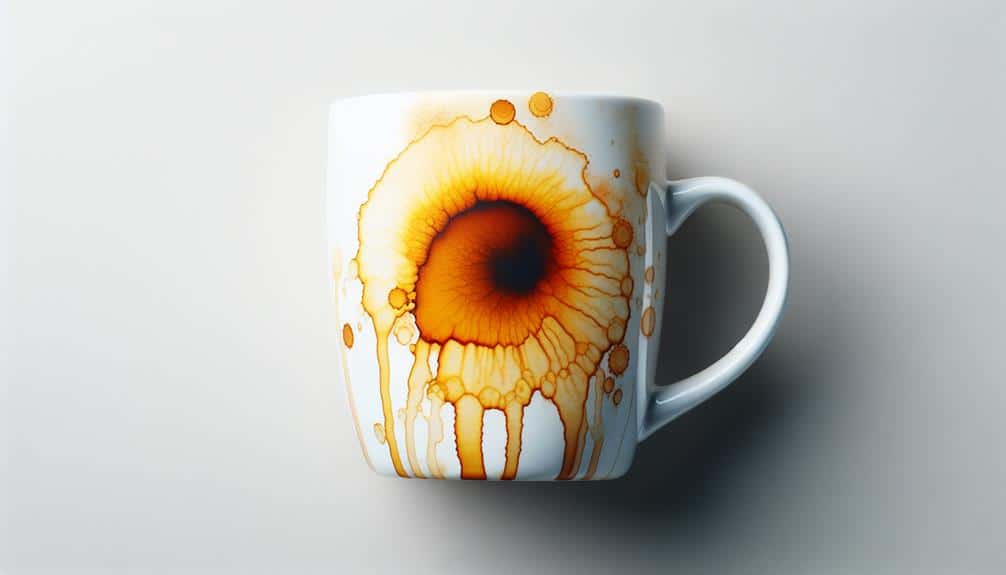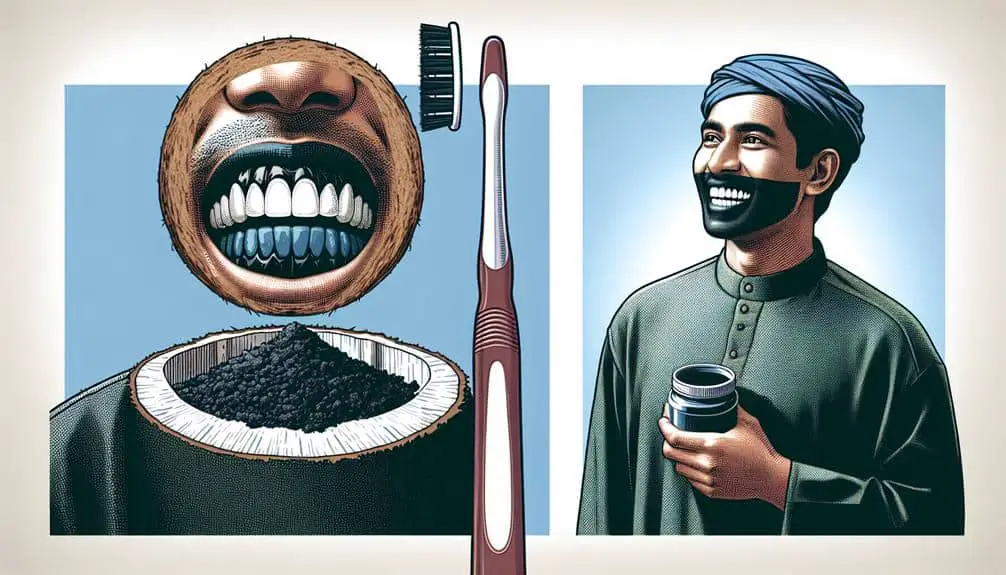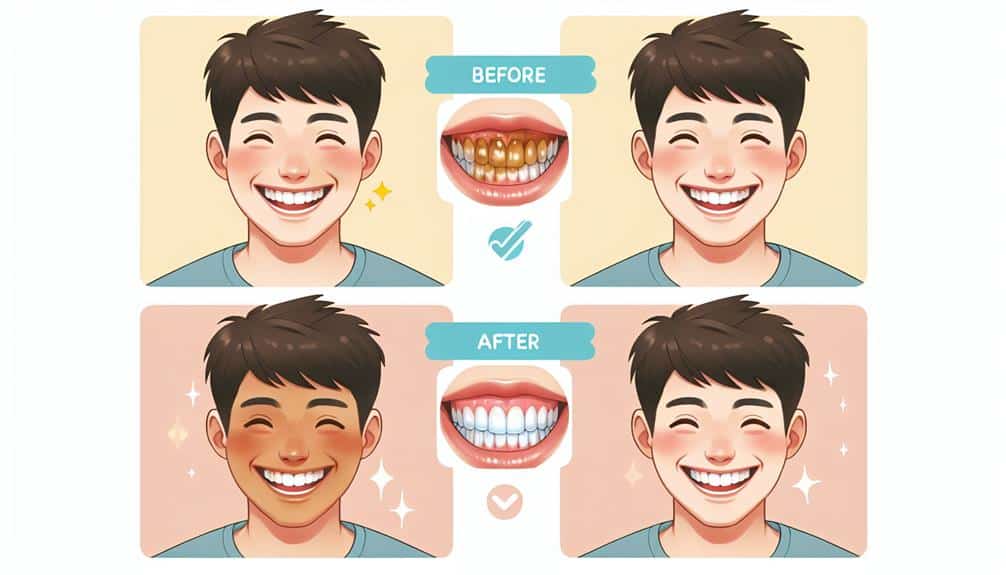To effectively remove long-term coffee stains, consider professional whitening treatments. These treatments involve bleaching agents like hydrogen peroxide and advanced procedures such as laser therapy. Adopting lifestyle changes, like a balanced diet and using whitening mouthwash, can also help maintain brightness. Consistent oral hygiene practices, such as brushing with fluoride toothpaste and daily flossing, are essential. Consulting with dental experts for personalized whitening options can further enhance results. Discover thorough strategies for long-lasting stain removal and bright smiles through detailed research on professional long-term coffee stain whitening techniques.
Key Points
- Regular dental cleanings maintain long-term whitening results.
- Customized at-home whitening kits for consistent treatment.
- Avoid coffee and other staining foods for lasting effects.
- Professional touch-ups recommended for sustained brightness.
- Consult with dentists for tailored long-term whitening plans.
Understanding Coffee Stain Formation
To comprehend the formation of coffee stains on surfaces, observe how the complex mixture of coffee compounds interacts with the material. When a droplet of coffee dries on a surface, the liquid evaporates, leaving behind a concentrated residue of compounds like tannins, oils, and pigments. These compounds adhere to the surface due to their chemical properties, forming the characteristic brown spot known as a coffee stain.
Prevention strategies are key in avoiding stubborn coffee stains. Using coasters, wiping spills immediately, and applying a protective sealant to surfaces can help prevent the compounds from bonding strongly with the material. However, if a coffee stain does occur, prompt action is essential. Stain removal techniques vary depending on the surface material. For fabrics, blotting with a mixture of water and detergent can be effective, while for hard surfaces like countertops, a paste of baking soda and water can help lift the stain. Understanding the chemistry behind coffee stains enables one to implement effective prevention and removal strategies, keeping surfaces looking pristine.
Professional Whitening Treatments
Understanding the chemical composition of coffee stains can lead to effective professional whitening treatments that target specific compounds for successful removal. Professional whitening procedures offer advanced techniques for stain removal that may not be achievable with over-the-counter products. These treatments often involve the use of bleaching agents like hydrogen peroxide or carbamide peroxide, which penetrate the enamel to break down and lift coffee stains effectively.
In-office whitening procedures conducted by dental professionals can provide quicker and more dramatic results compared to at-home treatments. These procedures may include laser therapy or light-activated whitening techniques that enhance the bleaching process for deeper stain removal. Dentists can customize the treatment based on the severity of the coffee stains, ensuring a personalized approach for the best whitening results.
Professional whitening treatments not only target surface stains but also address deeper discoloration within the tooth structure, resulting in a more thorough whitening effect. By opting for these advanced whitening procedures, you can achieve a brighter, stain-free smile under the expert care of dental professionals.
Lifestyle Changes for Brighter Teeth
For achieving brighter teeth, consider implementing lifestyle changes that promote oral health and minimize staining. Diet adjustments play an important role in maintaining a radiant smile. Foods and beverages high in sugar and acids can erode enamel and contribute to discoloration. Opt for a balanced diet rich in fruits, vegetables, lean proteins, and dairy. Incorporating crunchy fruits and vegetables like apples and carrots can help scrub away surface stains naturally.
Home remedies can also aid in achieving brighter teeth. Oil pulling with coconut or sesame oil is an ancient technique that can help remove bacteria and whiten teeth. Baking soda mixed with water to form a paste can gently scrub away stains without being too abrasive on enamel. Additionally, using hydrogen peroxide as a mouthwash in diluted form can help whiten teeth over time.
Maintenance Tips for Lasting Results
Implement consistent oral hygiene practices to maintain the brightness of your teeth for lasting results. Daily habits play an important role in preserving the effects of coffee stain whitening procedures. Brush your teeth at least twice a day with a fluoride toothpaste to remove surface stains and prevent new ones from forming. Flossing daily helps to clean between teeth where your toothbrush may not reach, reducing plaque buildup and discoloration. Additionally, consider using a whitening mouthwash to help maintain the whiteness of your teeth.
Preventive measures are also vital for long-term results. Avoid foods and beverages known to cause staining, such as coffee, tea, and red wine. If you do consume these items, brush your teeth or rinse your mouth with water afterward. Regular dental check-ups and cleanings are essential for monitoring your oral health and addressing any potential issues before they worsen. By incorporating these habits into your routine, you can extend the brightness of your smile and enjoy long-lasting results from your coffee stain whitening treatment.
Consultation With Dental Experts
Consider scheduling a consultation with dental experts to discuss personalized options for enhancing your smile through professional coffee stain whitening treatments. Expert recommendations and technique tips provided during these consultations can greatly impact the effectiveness of the whitening process. Dental experts can offer tailored solutions based on your specific needs, guaranteeing excellent results. By seeking professional guidance, you gain access to the latest advancements in dental technology and treatment protocols, increasing the likelihood of achieving long-term benefits from the whitening procedure.
During your consultation, the dental experts will assess your current dental health, the extent of the coffee stains, and any other relevant factors that may influence the whitening treatment. They'll then recommend the most suitable whitening techniques and products to address your unique situation. Following their professional advice can help you avoid common pitfalls and maximize the effectiveness of the whitening process. Ultimately, consulting with dental experts ensures that you receive personalized care and guidance to achieve a brighter, whiter smile.
Frequently Asked Questions
Can Using Whitening Toothpaste Alone Effectively Remove Long-Term Coffee Stains?
Using whitening toothpaste alone may not effectively remove long-term coffee stains. Consider incorporating whitening strips, bleaching trays, or seeking dental office treatment for more significant results. These methods can provide better whitening outcomes.
Are There Any Natural Remedies or DIY Treatments That Can Help Whiten Coffee-Stained Teeth?
When it comes to whitening coffee-stained teeth, natural remedies and DIY treatments can be effective. Your habits impact coffee stain prevention. Incorporate these strategies into your routine for brighter, healthier teeth without relying solely on whitening toothpaste.
How Long Does It Typically Take to See Noticeable Results From Professional Whitening Treatments?
For professional whitening treatments, results vary depending on the method used. In-office procedures typically show noticeable improvement after just one session. At-home treatments may take a few weeks to achieve desired whitening effects.
Are There Any Foods or Drinks to Avoid in Order to Prevent New Coffee Stains From Developing?
To prevent new coffee stains, avoid deeply pigmented foods like berries and drinks such as red wine, which can contribute to discoloration. Opt for lighter beverages and be mindful of dietary choices to maintain a brighter smile.
Can Smoking or Other Habits Impact the Effectiveness of Whitening Treatments for Coffee-Stained Teeth?
Smoking and certain habits can greatly impact the effectiveness of whitening treatments on coffee-stained teeth. Your lifestyle choices can influence how well these treatments work to restore the natural whiteness of your teeth.



